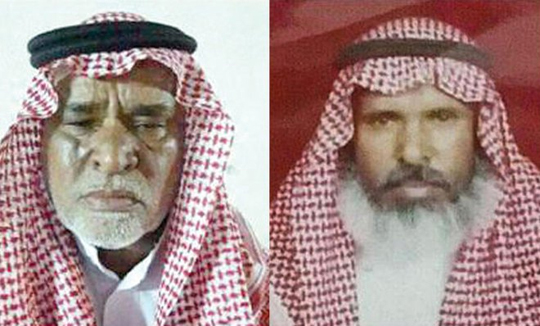Tabuk/ Riyadh, Jul 9: Fahd Musallam Hammad Al-Nujaidi Al-Bluwi has renounced his terrorist brother Naer Al-Bluwi, who carried out Monday’s suicide bombing in Madinah, stressing that he strongly rejects the terrorist act perpetrated in the vicinity of the Prophet’s Mosque.

He said his brother’s actions went against Islamic teachings and that all his family members have disowned Naer and condemned his crime.
Fahd said three years ago, Naer joined the Border Guards, but later quit and was living in Tabuk. He used to visit his parents in the Wajeh Governorate occasionally.
He stayed with them this last Shaaban. On Ramadan 25, he told them on phone he was going to Makkah.
Fahd said his sister had told him that she had seen some clips belonging to terrorists in her brother’s mobile, adding that he immediately reported that to the security agencies.
Feeling broken and frustrated, Naer’s father said no words could express his anger and disgust with what Naer had done. “I disown him.”
He said: “I feel hopeless and saddened by this crime that my son carried out. He does not represent me or my tribe, and all my family supports the country’s efforts to fight terrorism.”
Zaki Hammad Al-Bluwi, Naer’s uncle, said his nephew’s criminal act is far from religion and humanity.
He said Naer was a criminal who slaughtered Muslims in the holy month, against all values and principles, and he and his family stood united against anyone attempting to harm the nation.
Meanwhile, Maj. Gen. Mansour Al-Turki, Interior Ministry spokesman, said Naer had traveled abroad several times this year. He said the terror acts leave no doubts about their affiliation with terrorist organizations, especially Daesh.
“Enough evidence has been collected against those arrested and it shows that they supported Daesh,” said Al-Turki.
Investigations are under way, he said, stressing that the current security situation requires that people maintain calm and have patience. “The whole truth about the attacks will be revealed, after which the necessary legal procedures will be followed.”
Al-Turki said that preliminary investigations show that some of the 12 arrested Pakistanis have links with Daesh. The material used by the suicide bomber in Jeddah, nitroglycerin, is the same as the chemical used in the Qatif and Madinah bombings, he said.
Chemical expert Hisham Al-Sharqawi said one of its components, glycerin, is sold in drug stores and pharmacies as a moisturizing cream. It was transformed into explosives by the bombers. “This also indicates that the explosive belts came from the same source. The suspects who were arrested are affiliated with Daesh,” he said.
“It is one of the oils that are used as catalysts for explosives. When it is exposed to high temperatures, it explodes instantly,” he explained.
Al-Sharqawi said that some forms of acidic materials can become incendiary formulations, and that the most dangerous compounds within those materials are typically available for everyday use in various forms.
Nitroglycerin has been linked to several terrorist attacks in Saudi Arabia, and is a primary material in explosive belts.





Comments
Add new comment